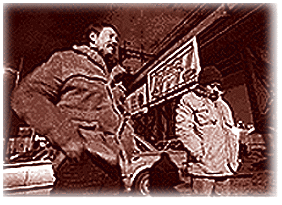



By Melissa Lauber
As the thermometer dips and cold cuts through the city streets, churches all around the country are opening their doors as temporary homeless shelters. Into one of these shelters, stumbles Vincent, a former drug dealer, turned philosopher, who is now just trying "like all God's children, to make it through the night."
Full of church-cooked chicken and sugar-drenched coffee, Vincent is sometimes taken aback by the fact that he is now on a first name basis with people who crawl into abandoned building to sleep among the rats or curl up in dumpsters to keep warm and out of the way.
He looks with a wary eye at those who try to categorize this country's two million homeless people and cautions people about making generalizations. "It's like a diamond," he said. "There are so many facets."
But some facts are clear. Reports from America's mayors and the National Council on Homelessness show that:
 Another startling statistic: last year, a Gallup survey found that only 16% of those polled recognized the possibility that they too could become homeless.
Another startling statistic: last year, a Gallup survey found that only 16% of those polled recognized the possibility that they too could become homeless.
Those who work at the Heart's Place Shelter, at St. John's United Methodist Church of Baltimore, Md. where Vincent stays, find such feelings absurd. They wonder how many paychecks most Americans are from being homeless.
They also shudder at the thought that it's so easy to cast the homeless into the role of "the other." For Carol Berman, the founder of Heart's Place, the homeless were once "a project."
"When Heart's Place began, I must admit, I used to think, 'oh those poor homeless people,'" Berman said. "It was a charity thing."
But after providing 195 "bed-nights" to guests of Heart's Place her "faith has been broadened" and she has "a much better grasp of what Jesus was talking about."
Watching the guests check in, Berman now looks at the 40-year old black man who walks on crutches and sees their shared humanity. "We both have dreams," she said. "We both want to be accepted for who we are. We both need love. It's the heart things we share."
It's also the heart things that Vincent wishes the church would begin to understand. "If it stops at the door on Sunday morning, it ain't church," he said.
For another Heart's Place volunteer, the intensity of the pain the homeless bring in with them can be staggering. However, faith gives the work of the shelter a perspective. "Some of the people's stories hold utter hopelessness," he said. "In the face of that, I hold onto my belief in a loving God that so identified with us that he sent Jesus. Then, there's still something we can give them. We can give the example of Christ's love for them."
It's a love Vincent is growing to understand.
A 1992 Gallup survey found that "the spiritual" ranked highest among the "life themes identified as essential for recovery from homelessness." Although, Vincent probably wouldn't put it in such stark categorical terms, he does admit that it's "the heart things" that will change the world.
"That homeless guy may need a pair of shoes and appreciate that you gave them to him," he said. "But he also needs to be encouraged. Maybe he needs a hug, or a word, or a look that makes him feel that he too is a part of God's creation."
If home is where the heart is, "maybe I'm not homeless," Vincent said. For the moment, his heart is "settled." It's a feeling that helps him, and "all God's children, to make it through the night."
Photos by John Decker from his PhotoJournalist site.
Copyright © 1998 Villagelife.org Inc. All Rights Reserved